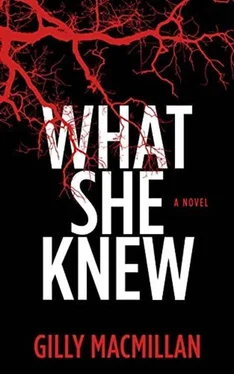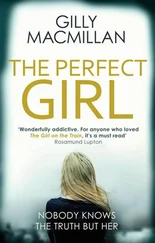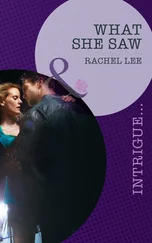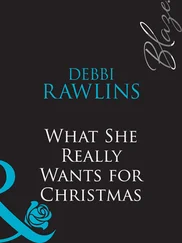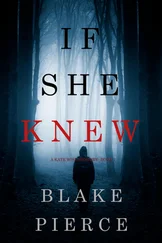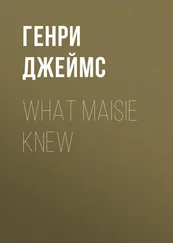‘I suppose it makes a change from asking for a lawyer. I feel like I’ve got something in my eye, have I got something in my eye?’ Fraser pulled down the mirror and pulled down an eyelid.
‘I don’t think he did it,’ I said.
She flicked the mirror back up brusquely.
‘What makes you say that?’
‘I agree that he looks good for it on paper, but he couldn’t take his eyes off your legs in there, and your…’ I felt shy suddenly.
‘My what, DI Clemo?’
‘Your shoes, your red shoes.’
‘Oh right. Well, for a moment there I thought you were going to say something else.’
Woodley snorted from the back seat and then tried to turn it into a cough.
‘So what’s your point, Jim?’
‘My point is that somebody interested in children is not usually interested in women, especially not in a fetishistic way. He couldn’t take his eyes off the red shoes. I was watching him.’
‘I still want him brought into the station. We can’t possibly rule him out because he looked at my shoes. You know that as well as I do. Woodley, I saw what you did at the end there. Very smart. When we bring him in, I want you to interview him and get to the bottom of his dirty little mind whichever way it bends.’
‘Yes, ma’am.’ I could hear the sound of a grin in Woodley’s voice.
‘I’m not your “ma’am”,’ she said. ‘“Boss” will do. Right, come on, Jim, what are we waiting for?’
Halfway through the morning Nicky announced, ‘I’ve spoken to John. He wants us to go round to his house so we can agree together on a design for a “Missing” flyer, and print some there. He’s got a laser printer.’
I’d never been to John and Katrina’s new house. Not past the front door anyway. I’d spent plenty of time standing on the gravel outside when I’d dropped Ben off for the weekend.
‘Will Katrina be there?’
‘I expect so, yes, but at this point I think you need to think of her as another pair of hands. She wants to help and we need all the help we can get.’
I thought of the blog and the comments I’d read this morning.
‘Any port in a storm?’ I said.
‘Exactly!’ she said, and she smiled just a little.
It pleased Nicky when I said that because it’s what our Aunt Esther used to say. ‘You’d been through a storm,’ she would say if we ever discussed the circumstances that had led us to live with her. ‘A terrible storm, and I was your port.’
‘A safe haven,’ Nicky would say and Esther would agree.
Esther had taken us in after our parents’ death. She was our mother’s much older sister. She brought us to her house immediately after the accident that killed our parents and we never left after that. She sheltered us from gossip, which sometimes hung around us like a cloud of biting midges. She gave us the chance to have a childhood, or her version of one.
It wasn’t a usual upbringing, because Esther was a spinster, who’d always lived alone. She taught English Literature A level to the children of the local wealthy at a small private school and could quote a huge amount of poetry by heart. She also played bridge and had a passion for growing roses. She wore knee-length skirts and flat shoes, with simple cardigans, and had bobbed flyaway white hair that she clipped back with kirby grips. She kept gold-topped milk in the fridge, which the birds had invariably pecked at before she brought it in in the morning, so each lid had neat puncture marks in it when it arrived on the breakfast table.
I don’t think Esther was a naturally maternal figure. She was unaccustomed to young children apart from a regular annual visit she’d made to our family before our parents died, so when Nicky and I arrived suddenly in her life she treated us as miniature adults, and shared her passions with us. She surrounded us with art and music and books, she pointed out the possibility of beauty in life. Nicky drank this up as if it were nectar, and fell into Esther’s arms gratefully.
I was different. When I was growing up I always felt like the baby that I’d been when we arrived there, a bit of an addendum to their lives, too little to understand things properly, always in bed when the proper conversations took place. It was ironic, as I’d never known our mother or father, that I was the one who found it most difficult to accept Esther in her role in loco parentis , while Nicky, nine years old when we arrived, wouldn’t leave her side.
As a teenager I’d meanly thought that Esther was fusty, tweedy and better suited to another era, more like other people’s grandparents than their parents. I’d rejected her gentle offerings of culture and knowledge because they hadn’t immediately bolstered me, or given me an obvious direction or purpose. That came later in life, when I took up photography, when I sat beside John in St George’s concert hall and fell in love with him and with classical music, and then I regretted that I’d never thanked her for what she did for us before she died.
It was because things hadn’t always been easy when we were growing up that it pleased Nicky whenever I said a kind word about Esther. It pleased her immensely.
I agreed to go to John’s house. Laura came round to housesit because I still couldn’t stand to leave it empty. Just in case. Nicky and I had to fight through the journalists to get to Nicky’s car. They jostled us, shouted questions at us. We ignored them, but the questions hurt. They were aggressive, and accusatory. Some of the photographers ran alongside the car as we pulled away, lenses at the windows, snapping away at our white, scared faces.
John and Katrina’s house was only ten minutes’ drive away, on a quiet suburban street where everybody had driveways and two cars parked on them at the weekend. The house was semi-detached, art deco in style, painted white, and had long, linear windows along the front of it, which would normally give a view into both their sitting room and office. When we arrived the curtains were drawn in both rooms, and there were journalists lounging on their low front wall like teenagers at a bus stop. They leaped to their feet at the sight of us.
John opened the door and ushered us in quickly. He looked dishevelled, and he was unshaven.
‘In the kitchen,’ he said.
‘John,’ I said, before we stepped out of the hallway. ‘I’m so sorry about the press conference, so, so sorry. I didn’t mean to…’
‘It’s OK,’ he said. ‘At least you didn’t just cry like a baby.’
It hadn’t occurred to me that John might be berating himself for his own behaviour. I’d thought mine so much worse.
‘Don’t be ashamed,’ I said, but he was already on his way into the kitchen.
Before I joined him I couldn’t help noticing the parquet floor in the hallway, and remembered what Ben had said about it: ‘There’s a shiny floor, but I’m not allowed to skid on it.’
Katrina stood in the kitchen beside a small round table. Like John, she appeared haggard and undone somehow. She was dressed in jeans, a T-shirt, a cardigan over it. She looked very young. She glanced at John as if expecting him to play host and when he didn’t she asked, ‘Can I get anything for you? Would you like a cup of coffee? Or water? Or tea?’
It was awkward being in their house, I can’t deny it, but together we made a flyer, and in some ways it was a relief to have something constructive to concentrate on.
Ben’s photo was prominent in our design, as was the phone number to contact. The word ‘MISSING’ ran along the top of the page. The plan was to print out one hundred copies there and then and Katrina said she would get more done at a local print shop. She and Nicky discussed how and where we should distribute them.
Читать дальше
